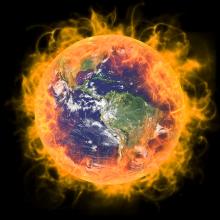Stewardship
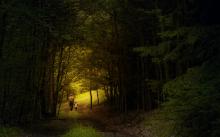
When you hear about stewardship in church, you probably think of your checkbook. Stewardship is the term we use to talk about financially supporting our churches and organizations. But another holy use of the word involves being stewards of creation.
When I hear the word stewardship, I feel the crunch of snow and branches under my feet. I see the trees and paths of the woods owned by my parents’ best friends, where I spent much of my childhood hiking, hunting, skiing, picking apples, and feeding chickadees out of the palm of my hand. It’s one of the places where I gradually heard my calling to work for the care of creation. And the word stewardship transports me to a specific day in my childhood, walking in the woods with my dad’s best friend, Leo, when he pointed to a tree and said he would have to take it down.
How could he kill a tree? I hassled him; I got indignant. I said that nature should be left alone to do her thing. But Leo explained that I was wrong — he managed the land. It wouldn’t be just fine on its own; rather, it needed his careful eye to manage the trails, cut down sick trees, and hunt deer.

I MET MARKKU and Leah Kostamo of A Rocha, an international Christian environmental organization, on the set of a television show in Toronto. The show was Context, hosted by the welcoming Lorna Dueck. This show explores the stories behind the news from a frankly Christian viewpoint.
I had been invited to talk with Dueck about my MaddAddam future-time book trilogy, and in particular about characters in the second book, The Year of the Flood, called the “God’s Gardeners,” a green religious group that raises vegetables and bees on flat rooftops in slums. It is headed by a man called Adam One and includes a number of ex-scientists and ex-doctors who have withdrawn from a too powerful, greedy corporate world in which they can no longer function ethically. The God’s Gardeners group represents the position—probably true—that if the physical world is going to remain possible for human life, religious movements of many kinds will be an important element. We don’t save what we don’t love, and we don’t make sacrifices unless “called” in some way to make them by what AA refers to as “a higher authority.”
Dueck and I talked a little about that, and then—surprise—right before me were two people who closely resembled the God’s Gardeners of my fiction. Leah and Markku Kostamo are walking the God’s Gardeners walk—through A Rocha, a hands-on creation-care organization. A Rocha’s origins go back to the Christian Bird Observatory (cf. St. Francis) founded on the coast of Portugal by Peter and Miranda Harris in 1983. Leah met the Harrises in 1996 when she took a class they were teaching at Regent College in Vancouver, British Columbia, and A Rocha Canada was born. It was soon augmented by Markku, an environmental scientist. A Rocha is now running 20 projects around the globe, engaged in everything from habitat restoration to organic community farming.

This past Sunday, I had the opportunity to watch our children’s ministry present through play, song, and dance the story of the birth of Jesus Christ.
No matter how many times I have seen this story, it’s always amazing that this miracle that happened in a manger could have such a huge impact on the lives of so many. Jesus was not born with a silver spoon in his mouth, his parents did not have the best reputation, and he definitely wasn’t birthed in a fancy hospital. Instead, he was born where animals were kept — not the best conditions environmentally at all! Further, Jesus Christ became an advocate for the poor, for those that do not always have a voice, and for those that were suffering from terrible mistreatment, disease, and sickness.
I truly believe that Jesus’s focus on the “least of these” is a model for advocacy, especially for the environmental justice movement.
BALLS THUMPED against the walls, jump ropes scraped the asphalt, and shrieks filled the air: The kindergarten and first-grade students of Holy Ghost Catholic School in Albuquerque, N.M., were at recess on a chilly December day. The sun was shining and the kids bumbled around in their jackets, oblivious to the cold. Also oblivious were the rows of leafy greens in the two raised-bed gardens just outside the classroom windows. The sun, plastic covers, and just enough water (which the students figured out after a failed crop or two) made for a perfect little garden oasis in the midst of winter.
Seeing me headed toward the gardens, dozens of children made a beeline for the structures, simultaneously shouting “Miss! Can I see?” “Miss, I’ll water them!” They helped me lift the cover to reveal a jungle of rainbow chard, kale, spinach, salad greens, a few radishes, and basil—a kaleidoscope of greens, golds, pinks, and yellows.
“Miss, can I have chard?” Mateo looked at me hopefully, chubby fingers pointing to the rainbow chard. “Sure!” I exclaimed, gently breaking off a leaf. “If you can name it, you can taste it!” Suddenly there were 15 hands in front of me, along with a litany of names: “The pink one!” “Chard! Chard!” “Can I have that spinach?!”
Not everyone was as enthusiastic. “Yuck,” Lenaia said when I offered her a piece of spinach. “I don’t want to eat it, but I’ll water it.”
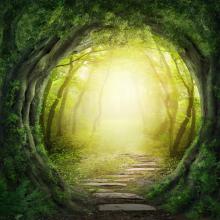
I had the privilege of teaching a pastoral theology class at Seminary of the Southwest in Austin, Texas, last week.
I had the entire senior class: 13 young, promising, enthusiastic, veterans of church wars, and yet eager to get started.
Like any speaker with a full deck of PowerPoint slides, I probably said more than was needed. But I wanted to make, reinforce, clarify, and leave no mistake about my main point: Business as usual is off the table.
After nearly 50 years of relentless decline in mainline churches, business as usual is a sinking ship. The way forward lies in fresh ideas, turnaround strategies, entrepreneurial enthusiasm for risk, and learning from failure.

I just completed my first Climate Ride, journeying 300 miles by bicycle over five days with 200 other climate activists. Climate Ride began five years ago, and the riders raise money for organizations that work on sustainability and climate change. They’re also a way to spread the word about the growing and increasingly determined climate movement. For those of us who take part – by now, thousands of us have – the rides have a deep and lasting impact.
These are my reflections from the last day of the ride; you can read reflections on the first four days of the Climate Ride here.

I love Netflix. I love that from the comfort of my couch, I can watch almost an endless selection of movies and TV shows. I’m re-watching all of The West Wing right now, along with most of Washington and probably much of the country. My friend Kat told me recently that she and her fiancé are watching it for the fifth time on Netflix, despite it sitting in a deluxe DVD set above their TV. Why get up to switch DVDs when your streaming player automatically starts the next episode for you?
So I wasn’t too happy when I read that my Netflix habit is seriously energy intensive. In a new article on Salon.com, I learned that watching Netflix streaming for an hour a week uses more energy each year than two new refrigerators. In my household we definitely watch a lot more than an hour a week.

Editor's Note: The following is an excerpt from Fred Bahnson's new book Soil and Sacrament: A Spirtual Memoir of Food and Faith.
The garden is our oldest metaphor. In Genesis God creates the first Adam from the adamah, and tells him to “till and keep” it, the fertile soil on which all life depends. Human from humus. That’s our first etymological clue as to the inextricable bond we share with the soil. Our ecological problems are a result of having forgotten who we are—soil people, inspired by the breath of God. “Earth’s hallowed mould,” as Milton referred to Adam in Paradise Lost. Or in Saint Augustine’s phrase, terra animata—animated earth.
The command to care for soil is our first divinely appointed vocation, yet in our zeal to produce cheap, abundant food we have shunned it; we have tilled the adamah but we have not kept it.

After traveling the country this spring — while keeping an eye on Washington, D.C. — I am more convinced than ever that our personal decisions, choices, and commitments will change the world more than our politics. The message in the Epilogue to On God’s Side says this as well as I could do again. It’s short and very practical. Here it is:
The common good and the quality of our life together will finally be determined by the personal decisions we all make. The “commons” — those places where we come together as neighbors and citizens to share public space — will never be better than the quality of human life, or the human flourishing, in our own lives and households.
Here are ten personal decisions you can make to help foster the common good.

Last week, concentrations of carbon dioxide in the atmosphere reached 400 parts per million – nearly 15 percent over what many scientists estimate is a safe level. Amid this and other crises in creation, the Environmental Protection Agency needs a strong leader to navigate the complex policy and economic situation that governs environmental policy.
In March, In March, President Barack Obama nominated Gina McCarthy to lead the EPA. At the time, many regarded her as a shoo-in, as she has held top posts under Republican governors, was endorsed by many in the energy industry, and has acted as assistant administrator of the EPA under President Obama since 2009.
It was surprising, then, when all eight Republican members of the Senate’s Environment and Public Works Committee decided to boycott McCarthy’s nomination hearing. This surprise decision, which effectively canceled the vote, was part of a longer-term pattern of obstruction and partisanship on once-routine matters.
In the face of such unprecedented risk to human health and well-being, many were surprised that senators tasked with studying issues of clean air, clean water, and similar issues put ideology ahead of fairness in obstructing the vote. Sen. David Vitter, the leader of the obstructionist group, said it best himself in 2005 when discussing judicial appointments: “I think that every nominee deserves a vote. It’s a matter of fairness.”
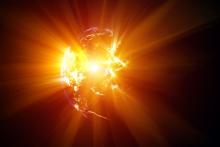
We in our era have accomplished something no other civilization would have considered possible — or desirable. We have taken human wastefulness and self-destruction to never-before-seen levels and we have distorted our scriptures to justify even celebrate — our own destruction.
Whether it is fracking (with its own legacy of toxic waste) the Keystone XL Pipeline (with its virtually guaranteed oil spills across prime farm land) accompanied by the largest population ever seen on the face of the earth — with its attendant garbage and sewage — we are seeing threats to our climate, food supply, economy, and quality of life on a level never seen before in human history.
Historically, theologies (and philosophy) have put a brake on human avarice, violence, and unbridled destruction of the environment.
Reflection and restraint, for millennia, have been the twin pillars of historic conservatism.
Not now.

In the secular American political world, even among progressives, two progressive focuses – social justice and healing of the Earth – have remained mostly segregated from each other.
But the Bible, in one of its crucial passages, intertwine social justice and the urge toward healing Earth. It is as if the Bible – after watching the alienation of two May Days (pagan spring and workers’ social justice) from each other – had shrugged impatiently and said: “Now here’s the way to do it!”
The Bible calls for an entire year of rest for the land and its workers, every seventh year. Deuteronomy adds that in that year, everyone’s debts are annulled. (Deut. 15: 1-3). Thus the Bible sees economics and ecologics as intimately intertwined, and calls for a practice of strong, spiritually rooted regulation of both.
Leviticus calls this seventh year a Shabbat Shabbaton – restfulness to the exponential power of Restfulness, an echo and expansion of the restful seventh day. Deuteronomy calls the year “shmitah” – “release” or “non-attachment.”
Why all this? Because, says YHWH, YyyyHhhhWwwwHhhh, The Interbreathing of all life, “The earth is Mine. You are but sojourners, temporary visiting-settlers, with Me.” (Lev 25: 23)

Have you ever heard someone described as, “So heavenly minded, he was no earthly good?” This phrase suggests one danger of interpreting the book of Revelation. Sadly, when it comes to considering the natural world and Revelation, heavenly mindedness often undermines care for our environment. Some Christians have a tendency to think, “Well, if I’m off to heaven, I shouldn’t care much about this silly earth of ours. It’s just a temporary home, after all.”
In fact, Revelation suggests the opposite: the earth isn’t truly “left behind,” but renewed, becoming the very dwelling place of God. Revelation 21 calls people to be, well, “earthly good,” caring for creation as we prepare for God to come home.
FOR MANY IN the global South, climate change is not an abstract theory. Victor Mughogho, executive director of the Eagles Relief and Development Programme in the southeast African country of Malawi, has experienced firsthand the toll of global warming and extreme weather. He works with local churches to develop practical and faithful solutions to mitigate the effects of climate change. Sojourners assistant editor Elaina Ramsey interviewed Mughogho early last year when he visited Washington, D.C.
Elaina Ramsey: How has climate change affected the people of Malawi?
Victor Mughogho: The impacts are quite severe on the ground. Rural people in Malawi constitute about 85 percent of the population. These people are subsistence farmers. For them, rainfall is everything. Without the rain, there's no agriculture, no livelihood.
The weather patterns have changed and are so unpredictable now. In the past 20 years, official records from the government show that we've had five severe droughts. Because of the cycles of drought, there is less and less water in the ground. The water table is sinking. Trees and grass are stunting and rivers are drying up.
If you asked a person "What will happen in the next 10 or 20 years?" they'd say that what's bad now, in retrospect, is going to look like a good time. It looks like worse times are coming ahead.
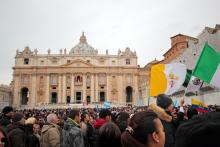
Editor's Note: Pope Francis delivered the following homily at his inaugural Mass on Tuesday, emphasizing the need to protect the poor and the environment.
Dear Brothers and Sisters,
I thank the Lord that I can celebrate this Holy Mass for the inauguration of my Petrine ministry on the solemnity of Saint Joseph, the spouse of the Virgin Mary and the patron of the universal Church. It is a significant coincidence, and it is also the name-day of my venerable predecessor: we are close to him with our prayers, full of affection and gratitude.
I offer a warm greeting to my brother cardinals and bishops, the priests, deacons, men and women religious, and all the lay faithful. I thank the representatives of the other Churches and ecclesial Communities, as well as the representatives of the Jewish community and the other religious communities, for their presence. My cordial greetings go to the Heads of State and Government, the members of the official Delegations from many countries throughout the world, and the Diplomatic Corps.
In the Gospel we heard that "Joseph did as the angel of the Lord commanded him and took Mary as his wife" (Mt 1:24). These words already point to the mission which God entrusts to Joseph: he is to be the custos, the protector. The protector of whom? Of Mary and Jesus; but this protection is then extended to the Church, as Blessed John Paul II pointed out: "Just as Saint Joseph took loving care of Mary and gladly dedicated himself to Jesus Christ’s upbringing, he likewise watches over and protects Christ’s Mystical Body, the Church, of which the Virgin Mary is the exemplar and model" (Redemptoris Custos, 1).
How does Joseph exercise his role as protector? Discreetly, humbly and silently, but with an unfailing presence and utter fidelity, even when he finds it hard to understand. From the time of his betrothal to Mary until the finding of the twelve-year-old Jesus in the Temple of Jerusalem, he is there at every moment with loving care. As the spouse of Mary, he is at her side in good times and bad, on the journey to Bethlehem for the census and in the anxious and joyful hours when she gave birth; amid the drama of the flight into Egypt and during the frantic search for their child in the Temple; and later in the day-to-day life of the home of Nazareth, in the workshop where he taught his trade to Jesus.
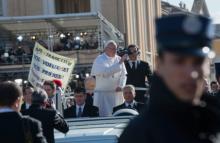
VATICAN CITY — Pope Francis issued a powerful call for the protection of the environment and of society’s most vulnerable during his formal installation Mass at the Vatican, while qualifying his papal power as a “service” to the church and to humanity.
The pope on Tuesday celebrated a solemn Mass in St. Peter’s Square in front of an estimated 200,000 people, as well as political and religious leaders from all over the world.
During the Mass, Francis received the symbols of his papal authority over the world’s 1.2 billion Roman Catholics: the pallium, a lamb’s wool stole that recalls Jesus as the Good Shepherd, and the “ring of the fisherman.”
In keeping with the low-key style that has been the hallmark of his pontificate so far, Francis presided over a somewhat simpler, and definitely shorter, rite than the one that marked the start of Benedict XVI’s reign in 2005.
Francis was slowly driven around a sun-drenched St. Peter’s Square in an open-top car, shunning the bulletproof, air-conditioned popemobile preferred by his predecessors. At one point, he asked to stop the car and got out to bless a disabled person.
In his homily, delivered in Italian, Francis described the church’s mission as “respecting each of God’s creatures and respecting the environment in which we live.”
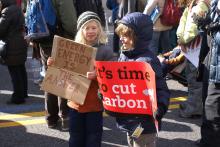
This past Sunday an estimated 35,000 people gathered in Washington, D.C., to push for legislative action in response to climate change. In addition to speaking out against the proposed Keystone XL pipeline, the “Forward on Climate” rally organizers urged President Barack Obama to limit U.S. greenhouse gas emissions and transition to larger levels of renewable energy. In addition to the mass assembly near the White House, environmental groups held similar rallies in cities across the nation, including a significant turnout in Los Angeles. All together, some have described the events of the past weekend as the largest collection of climate change rallies in U.S. history.
The president has recently emerged as a potentially strong ally in the struggle against climate change, for his inaugural address included a renewed commitment to environmental leadership, as he stated: "We will respond to the threat of climate change knowing that the failure to do so would betray our children and future generations.”
President Obama also addressed ecological concerns during his State of the Union speech, as he said: “We can choose to believe that Superstorm Sandy, and the most severe drought in decades, and the worst wildfires some states have ever seen were all just a freak coincidence. Or we can choose to believe in the overwhelming judgment of science – and act before it's too late." While conversation surrounding climate change was notably absent during his recent re-election campaign, the president appears to be making environmental concerns a top priority for his second term of office.
While President Obama seems to be a more visible environmental advocate, many are doubtful of his sincerity and question whether such statements are motivated by political calculation rather than genuine policy priorities. For example, in what can be described as a thought-provoking twist of irony, while thousands marched past the White House to move the president “Forward on Climate,” he was out golfing, which just so happens to be a sport that many environmentalists perceive as an ecological tragedy.
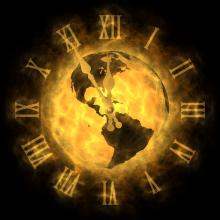
In contrast to the ongoing public and political debate surrounding the legitimacy and urgency of climate change, the global scientific body of knowledge appears to be overwhelmingly clear, as highlighted in The Great Disruption by Paul Gilding:
"The consensus position on climate change is reflected in the rigorously peer-reviewed journals in which research is presented and issues are debated. One study by Naomi Oreskes, published in the journalScience, demonstrated that of the papers whose abstract contained the keywords global climate changebetween 1993 and 2003, none questioned the consensus position – not one. Oreskes’s subsequent book,Merchants of Doubt, revealed how many who once fronted the tobacco industry’s anti-science campaign to deny the link between smoking and lung cancer are also now prominent and vocal climate change skeptics, and they are often funded to create doubt that has no credible scientific basis."
A FEW YEARS before American naturalist John Muir heeded the call of the California mountains, the boggy swamps and towering palm trees of a much flatter territory beckoned him south to the Gulf Coast states. As for many young travelers before and since, a journey into exotic lands was a path toward vocational and spiritual enlightenment for Muir.
In Restless Fires: Young John Muir's Thousand-Mile Walk to the Gulf in 1867-68, Whitworth University emeritus professor James B. Hunt explores how that trip forever changed Muir's perspectives on humans' relationship to the natural environment. Digging deep into Muir's childhood, Hunt details how Muir's theological transformation shaped his environmental stewardship.
It's a wonder Muir maintained any divine belief system. Muir's Scottish father, a strict practitioner of Campbellite Christianity, nearly beat faith out of him, combining forced Bible memorization with harsh physical punishment. Hunt contends an unfortunate twist of fate may have opened the door to Muir's escape from suffocating under zealous religion and monotonous factory life. He lost an eye while working as a machinist, which caused temporary sympathetic blindness in his other eye. As soon as Muir was able to see again, he left the Midwest in a southward walk toward what he imagined was North America's Eden.
